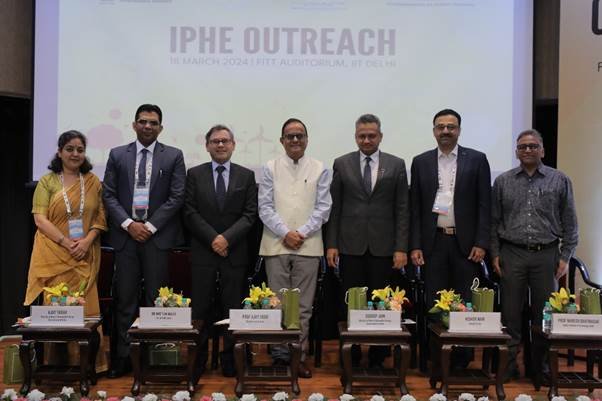Yadav underlines importance of Green Hydrogen as an alternative fuel
While hydrogen is not a very new technology, there is a need to work together to make it more economical and cleaner, Principal Scientific Advisor, Government of India, Prof. Ajay Sood pointed out at the 41st Steering Committee Meeting of the International Partnership for Hydrogen and Fuel Cells in the Economy (IPHE) held in 18–22 Mar 2024.
He emphasized on the importance of skill development and R&D in the sector and mentioned that besides the Ministry of New & Renewable Energy, various other Ministries of the Indian Government of are also making efforts for adoption of Green Hydrogen.
The Principal Scientific Advisor highlighted that the major areas of work in the hydrogen value chain include five components, namely, Production, Storage, Transportation, Distribution & Consumption https://www.iphe.net/ .
Additional Secretary, Ministry of New & Renewable Energy, Sudeep Jain also highlighted the importance and challenging nature of climate change.
He emphasized the work, collaboration and partnership that would be required from academia and research institutes for facilitating energy transition and development of the hydrogen sector https://pnwh2.com/ .
He underlined the importance of moving away from grey hydrogen and bringing about a larger share of green hydrogen https://mnre.gov.in/ .
Vice-Chairperson, IPHE, Noe Van Hulst noted that India https://gh2.org/countries/india as an economic powerhouse, an engine of global economy and a decisive actor in shaping the clean energy future.
He emphasised on the requirement of skills, educational outreach and Research & Innovation in shaping the future of Clean Hydrogen and the role of academia in this regard.
Dean (R&D), Indian Institute of Technology Delhi, Prof. Naresh Bhatnagar pointed out that IIT Delhi https://home.iitd.ac.in/ has been involved in R&D of hydrogen-fuelled vehicles for the past two decades.
He informed about courses offered by the institute at undergraduate, masters and PhD levels on various subjects in energy systems and also about the R&D being conducted at IIT Delhi on high-pressure storage at 750 bar Hydrogen cylinder.
Chief Executive Officer, Avaada Group https://avaada.com/ , Kishor Nair talked about India’s and other countries’ initiatives towards Energy Transition and their Net Zero commitments.
He also requested Academia, Research & Innovation fellows to come forward with technology ideas to make hydrogen production, storage, transportation and applications more efficient and cost-effective.
In his welcome remarks at the opening of the conference, Joint Secretary, Ministry of New & Renewable Energy, Ajay Yadav, underlined the importance of Green Hydrogen as an alternative fuel of the future and highlighted the steps being taken by the Indian Government for promoting green hydrogen under the National Green Hydrogen Mission.
The event also featured engaging activities including poster presentations and a quiz competition, culminating in the announcement and prize distribution to three winners in each competition.
The IPHE Academic Outreach also featured two insightful panel discussions. The first panel discussion, titled “Empowering Expertise: Cultivating Skill Development in the Clean / Green Hydrogen Arena”, focused on development of the knowledge and skills necessary to thrive in the clean / green hydrogen sector. The panel highlighted the requirement of skilled personnel in the field of Green Hydrogen, requiring different sets of safety, security and regulatory standards. The need for new skill interventions for the thematic areas and for hands-on training for the green hydrogen sector was also highlighted by the Panel.
The second panel discussion titled “Unveiling the Future: Clean / Green Hydrogen Technologies and Its Transformative Applications”, explored the frontiers of clean / green hydrogen research and innovation, discussing its transformative potential across various industries. Considering the present cost of production of hydrogen, its storage, transportation and consumption, the panel expressed the need to bring down these costs by technology improvement, efficient production / utilisation through R&D and by increasing the demand through regulatory framework.
The IPHE, established in 2003, comprises 23 member countries and the European Commission, and is dedicated to advancing hydrogen and fuel cell technologies globally. The biannual IPHE Steering Committee Meetings serve as a crucial platform for fostering international collaboration and coordination among member countries, stakeholders, and decision-makers. Fiinews.com










